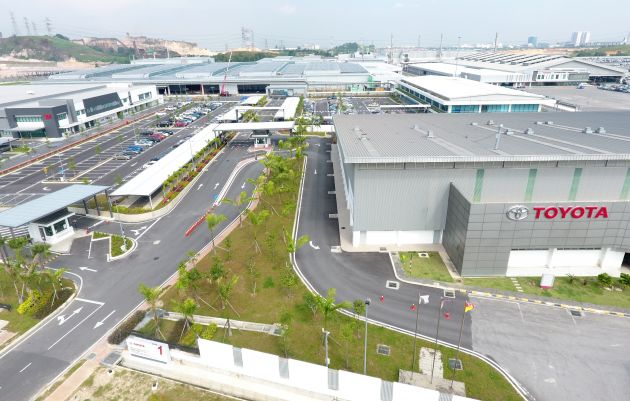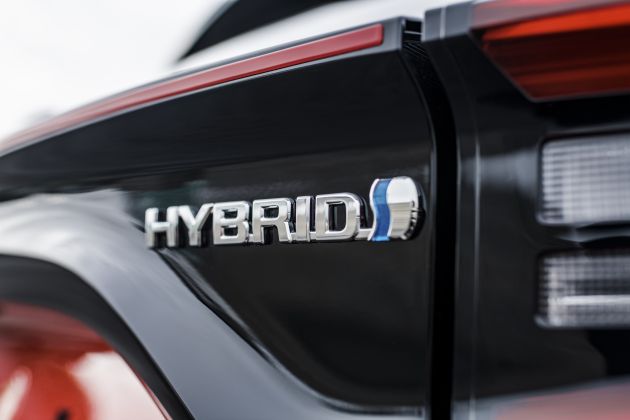UMW Toyota Motor (UMWT) today announced its carbon neutrality direction, which will pave the way for local mass production of hybrid vehicles. The initiative is driven by parent company Toyota’s global commitment to deliver ‘mobility for all’ and produce ‘happiness for all’ through its commitment towards a ‘Clean, Safe and Secure Society’.
To realise this, Toyota Motor Corp (TMC) has committed to carbon neutrality by 2050, in a practical and sustainable manner. Part of the plan is to produce a full line-up of low-emission vehicles through electrification that will meet diversified mobility demands all over the world.
Cars aside, there are many initiatives in the pipeline to reduce carbon emissions and offset the impact of CO2 emissions in all processes throughout the lifecycle of manufacturing, transporting, operating, fuel and/or charging, and recycling and disposal of vehicles. This is a global approach towards assessment of the potential environmental impact of a product throughout its lifecycle.
“Toyota’s direction is in line with the international lifecycle assessment approach for carbon neutrality which will entirely transform the industry, from the time a vehicle is manufactured and through the vehicle’s ownership, eventually even towards the end of the vehicle lifecycle,” said UMWT deputy chairman Akio Takeyama.
“Toyota’s global direction is to achieve carbon neutrality by 2050. This is also in line with the Malaysian government’s aspirations to position the country as a progressive nation that promotes more green technology and environmental sustainability.
“This is indeed an exciting time for the Malaysian automotive industry and UMWT is fully charged and ready to champion this Malaysian dream. In order to achieve this, the most realistic, practical and immediate solution is Toyota hybrid electric technology and vehicles. The mass production and growing acceptance of HEV will lead to the entire automotive eco-system evolving to embrace a more conscious and concerted effort in reducing Malaysia’s carbon footprint,” he added.
UMWT says that it will invest a further RM270 million into expanding its current manufacturing operations and facilities. This amount includes, amongst others, the introduction of a “new and technologically-advanced generation of HEVs”.
“We are ready (with the introduction of HEVs), and the technology, service support, current infrastructure, global and domestic policies, the level of affordability and cost effectiveness, and consumer awareness and demand, particularly in Malaysia, are now at its most ideal conditions to pursue a new and exciting journey towards achieving carbon neutrality,” Takeyama said.
“Toyota hybrids are at their most advanced today, and presents itself as the most realistic, immediate, economical and practical solution for mass market production and sale in terms of reduced CO2 emission, convenient usage, and price acceptance by customers,” he added.
As we all know, Toyota is a hybrid pioneer and has over two decades of history with HEVs, with over 17 million electrified vehicles sold to date, including plug-in hybrids, full EVs and hydrogen fuel cell cars worldwide. The Japanese giant says that from the above, the cumulative contribution to CO2 reduction equates to 17 million cars or the removal of 140 million tonnes of CO2.
Toyota’s grand plan is to sell eight million electrified vehicles per year by 2030. In April this year, the company announced an EV strategy that will result in 15 new full EVs released by 2025. That will be part of 70 electrified vehicle models by 2025. Once again, electrified includes HEVs, PHEVs, BEVs (full EVs) and hydrogen FCEVs.
Just hybrids when many are already plugging in their cars to the grid? A bit old hat? Toyota says that research has shown that the reduction in CO2 emission levels between full EVs and hybrids are almost similar when taking into account electricity source and the whole lifecycle of the car. Basically, the carmaker’s stand is that it’s too early to focus only on EVs, and it’s best to keep powertrain options open for customers to choose.
For Malaysian car buyers, the local manufacturing of Toyota HEVs “would translate into advancing into a new era of motoring, one that gives them access to the latest and most innovative technologies, at a price point that is practical and accessible to the greater masses,” UMWT says.
“Hybrids are a pivotal bridge to achieving full vehicle electrification. At present, the battery electric technology still requires time for full technology development making HEV tech most appropriate for immediate implementation. While time is still needed for full electrification, HEV tech is ready today and the current infrastructure permits for it to be rolled out on a greater scale,” Takeyama explains.
“The introduction of HEV tech will quickly transform the automotive landscape in Malaysia for Malaysians. We hope that our endeavours to popularise tomorrow’s technology today through the mass introduction of HEV will receive due support from the government in the pursuit of a full scale realisation of vehicle electrification. We hope that the government will also consider UMWT’s efforts to be included in the National Low Carbon Mobility Blueprint alongside BEVs which is in line with the government’s plans,” said UMWT president Ravindran K.
More on Toyota’s views on electrification and EVs here.
The post UMW Toyota to produce hybrid models in Malaysia, invests RM270m in local operations and facilities appeared first on Paul Tan's Automotive News.







0 Comments